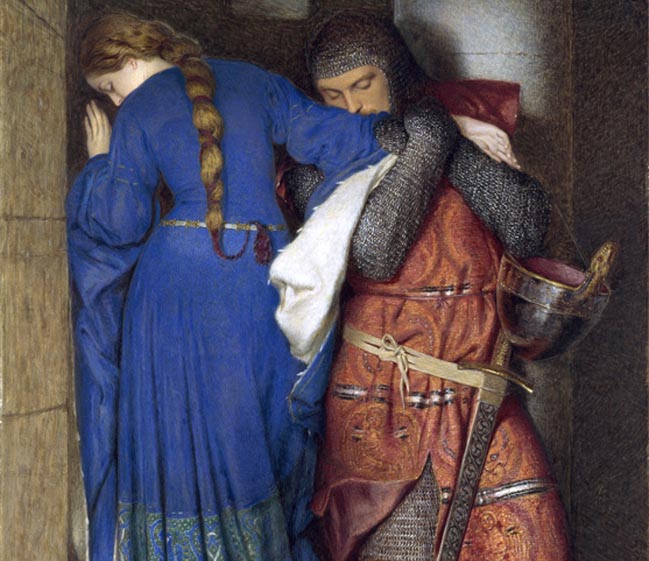
Hellelil and Hildebrand, The Meeting on the Turret Stairs
The poem is one of my long time favorites. From high school? College? My initial acquaintance is lost in the mists of time. But I love it.
The painting, Meeting on the Turret Stairs, is called “Ireland’s Favorite Painting” by the National Gallery of Ireland. I adore it. And I think it fits the mood of the poem quite well.
A Valediction: Forbidding Mourning
By John Donne
As virtuous men pass mildly away,
And whisper to their souls to go,
Whilst some of their sad friends do say
The breath goes now, and some say, No:
So let us melt, and make no noise,
No tear-floods, nor sigh-tempests move;
‘Twere profanation of our joys
To tell the laity our love.
Moving of th’ earth brings harms and fears,
Men reckon what it did, and meant;
But trepidation of the spheres,
Though greater far, is innocent.
Dull sublunary lovers’ love
(Whose soul is sense) cannot admit
Absence, because it doth remove
Those things which elemented it.
But we by a love so much refined,
That our selves know not what it is,
Inter-assured of the mind,
Care less, eyes, lips, and hands to miss.
Our two souls therefore, which are one,
Though I must go, endure not yet
A breach, but an expansion,
Like gold to airy thinness beat.
If they be two, they are two so
As stiff twin compasses are two;
Thy soul, the fixed foot, makes no show
To move, but doth, if the other do.
And though it in the center sit,
Yet when the other far doth roam,
It leans and hearkens after it,
And grows erect, as that comes home.
Such wilt thou be to me, who must,
Like th’ other foot, obliquely run;
Thy firmness makes my circle just,
And makes me end where I begun.






Another terrific post- thank you!
I wonder if Eliot consciously or unconsciously was playing with Donne’s images in the Four Quartets eg “in the end is my beginning” etc? As I read this the one kept resonating with the other although he uses the images for a different purpose. Donne seems so warm and high spirited whereas Eliot seems more naturally coolly reflective (though no less full of feeling.)
My favourite line is:
“…not yet
A breach, but an expansion,
Like gold to airy thinness beat.”
Interesting thought. Eliot certainly admired Donne and the Metaphysical Poets, so it would be rather in character for him to play with Donne.
I do love “gold to airy thinness beat” and also “Inter-assured of the mind,” and the image of the compasses.
By the way, I’ve really been enjoying the poems and pictures you’ve been posting, but I can’t figure out how to leave comments.
Thank you so much! I’m loving wandering through the museums of the world (virtually) looking at paintings and reading poems for the daily post.
Re commenting- at the top under the title In The Delectable Mountains is the word ‘ask’. If you click on it you can write anything you like in the text box and it comes to my email. I can reply that way too.
And yes, the compass image is wondrous. I can’t think of many good conceits of sacramental love. There’s a poem -am trying to remember the title- which likens the lover/him to a wooden post in a house and the beloved/her to ivy. But it’s a bit he:strong, her:clingy…
Thanks. I will try to leave comments from now on. I thought the ask might be it, but I wasn’t sure it it was the same as commenting.
My favorite conceit for married love is actually a pagan one: the bed of Odysseus which is constructed around a living olive tree– the tree trunk forms one of the bed posts. It’s the perfect conceit for Odysseus and Penelope, the game piece in their long battle of well-matched wits. But that idea of marriage being rooted, unmoveable has always stuck with me. I haven’t pondered how well it applies to a Christian understanding of matrimony. I wonder if it does hold up under that lens. Anyway your idea of the wooden post made me think of it and wonder if the poet didn’t have the Odyssey in mind too, combining it with the imagery from the psalms of the wife as a fruitful vine.
That sounds quite a promising vein… I’m hunting for that poem now!
Also, look for tomorrow’s poem. When I found it last night I knew I had to post it. It fits this discussion perfectly.